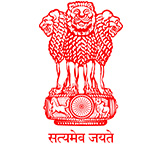National Academy of Audit and Accounts, Shimla
By Shri L. V. Sudhir Kumar, IA&AS, Director General, NAAAA, Shimla
The Indian Audit & Accounts Department (IA&AD) has a history of over a hundred and fifty years. The Audit Department was formed in 1860 when the Government's Accounting and Auditing functions were amalgamated and placed under the Auditor General of India. In 1919, the Auditor General was given statutory recognition. In 1935, the status of the Auditor General was further enhanced and in 1950, when the Constitution came into force, the Auditor General was re-designated as the Comptroller & Auditor General (CAG) of India. In 1971, the CAG's (Duties, Powers and Conditions of Service) Act was formulated which defines the duties and powers of the CAG of India and derives its authority from Article 148-151 of the Constitution.
Role of Indian Audit and Accounts Department
In the discharge of his duties, the CAG of India conducts Financial, Compliance and Performance audit of all units and formations of the Union and State Governments, Government Companies, Autonomous Bodies and such other organizations that are substantially financed by the Union and State Government. The Committees concerned of the Parliament and State Legislatures examine the results of audit, which are brought out in the Audit Reports of the CAG of India, and recommend corrective action.
Another important role performed by the CAG of India is the compilation of accounts of the State Governments and regulation and authorization of entitlements like Provident Fund and pensionary benefits of State Government employees in most States.
For carrying out his diverse functions, the CAG of India is assisted by one of India's oldest and premier services - the Indian Audit & Accounts Service (IA&AS), whose officers are deployed in offices spread throughout the country besides three overseas offices located at London ,Washington and Kuala Lumpur.
While the officers of IA&AS are required to acquire and possess not only the professional skills of an accountant and auditor, they are primarily trained to develop administrative competence to manage the staff of the IA&AD which has a strength of nearly 60,000 personnel. Their job requirements include scrutiny of intricate contracts, understanding of tax and revenue laws, assessing the financial health of commercial corporations, grasping for instance the complexities of oil exploration or the working of an atomic power plant and comprehensively reviewing the effectiveness of implementation of country-wise schemes for rural development, health services, education etc. IA&AS officers also go abroad to conduct audit of Embassies and High Commissions of India situated all over the world.
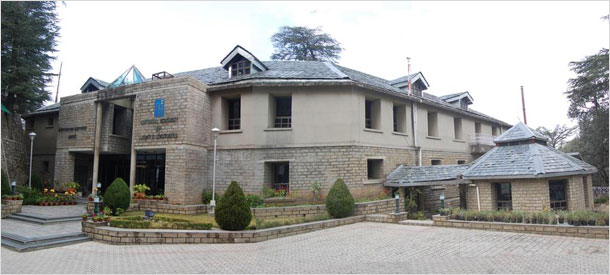
Training of IA&AS officers
With the intention of creating a cadre of disciplined and efficient officers, Shri V. Narahari Rao, the first CAG of India (1948-1954), decided to institutionalize training arrangements for IA&AS officers by setting up the IA&AS Training School at Chadwick House in Shimla in 1950. This not only greatly enhanced the functional efficiency of the Department, but also led to the Training School emerging as a premier training institute in India.
Just prior to the implementation of this wide-reaching departmental training arrangement, the IA&AS Training School had functioned for a year at Chennai. It was renamed as the IA&AS Staff College in 1969, and upgraded on 28th February 1990, as the National Academy of Audit & Accounts.
The National Academy of Audit and Accounts (NAAA) is the apex training institute of the IA&AD. It has trained hundreds of Officer Trainees of the IA&AS over the years, with the objective of moulding them to into highly professional and competent Officers.
The NAAA thus plays a vital nurturing role in helping the IA&AD to discharge its constitutional mandate, under the guidance of the CAG of India. The institute also offers mid career and in-service training to officers at the Executive as well as higher management levels within the Department.
The Academy and its hostel complex, Yarrows, are situated among the verdant splendor of the Dhauladhar hills, with the formidable Himalayas appearing as a splendid backdrop. This picturesque locale, along with the towering cedar trees and the diverse range of local wildlife, make for a truly scenic setting.
The NAAA represents an interesting confluence of academic rigour and intellectual freedom. The campus is a virtual melting pot where people across generations, from every part of our country and beyond, come in contact with each other. It is a place where participants from every state of our diverse country, speaking different languages, with diverse qualifications and socio-educational backgrounds meet, interact and learn from each other.
Since its inception, more than 60 batches of IA&AS officers have received comprehensive and holistic training at the Academy, and have carried out their responsibility towards assisting the CAG of India in discharging his constitutional and statutory duties.
Incidentally, it is not only Officers of the IA&AS who have flourished under the expert and proficient framework of the Academy, but also Officers from other services like the Indian Railway Accounts Service (1950s) and the Indian Civil Accounts Service (1984-92) who were trained here along with the IA&AS probationers. The Academy has also extended its academic and professional training expertise to Officers from foreign countries such as Nepal, Bhutan and Oman.
The Academy has aided transformations in the Department by being attuned to the changing environment facing IA&AS Officers. This has resulted in the Academy being flexible, constantly updating and re-orienting its training programmes to ensure they are relevant to the Department's needs and in sync with best practices from Supreme Audit Institutions (SAIs) in other countries. Over the years, the NAAA has made a steady transition from being merely an outstanding training institute to becoming a prestigious institution in its own right in the IA&AD .
Vision and Mission
The vision of NAAA is to become a centre of excellence and innovation for good governance and public financial accountability through research and training in public auditing and accounts.
The NAAA's mission is to:
- Create a learning environment that fosters individual growth and highest ethical and professional standards in our officers;
- Develop and mould, through our well-structured and holistic training courses, a cadre of competent officers, well-versed with contemporary best practices in the field of public administration, auditing, accounting and good governance;
- Impart managerial skills and leadership qualities to officers, so that they are well- equipped to carry out the critical responsibilities and duties entrusted to the SAI of India;
- Inculcate in the trainees a deep sense of pride in the Service and appreciation of the vital role played by the office of CAG of India and the IA&AD in the national polity;
- Promote and carry out research in the field of auditing and accounting and good governance with a view to facilitate better policy formulation and more efficient auditing/accounting procedures.
The Academy functions as a field office under the CAG of India and reports in all matters to the Dy. CAG. For training curriculum and related matters, the Academy is guided by a Central Training Advisory Committee, consisting of senior management of the organization of the CAG of India.
The Academy is headed by the Director General, who is an officer of IA&AS of the rank equivalent to the Additional Secretary to the Government of India (GoI). The Director General is assisted by faculty members who are all officers of the Indian Audit & Accounts Service. The faculty members train the Officer Trainees on various subjects as per the training syllabi. They function as Course Directors and Coordinators for different Semesters and Phases of the Induction Training for Officer Trainees, the various in-service training programmes, seminars and visits of foreign delegations. They also function as Counselors to the Officer Trainees and provide professional guidance and personalized attention to them. In addition, they look after administrative functions relating to the Academy complex, hostel complex, information technology, infrastructure and training matters.
Training Programs at NAAA
Academy conducts the following types of courses:
- (I.) Induction Training for directly recruited officers of Indian Audit and Accounts Service is in two phases of 54 weeks and of 06 weeks respectively. The Officer Trainees are also given Field Training for 34 weeks in the various AG office in between the two phases;
- (II.) Programmes aimed at enhancing the effectiveness of Group Officers in the IA&AD. These programmes are divided in two distinct categories. Refresher Courses in identified areas and Skill-oriented training programmes in Computer Systems &Applications;
- (III.) Some vertically integrated courses in order to facilitate experience sharing and some seminars/workshops on subjects of topical interest from time to time;
- (IV.) Orientation training programmes for newly promoted IA&AS officers;
- (V.) ' Inter Services Workshop on Best Practices in Governance' sponsored by DoPT;
- (VI.) Course for IAS officers for 'Improving Governance through Accountability';
- (VII.) Courses for outside agencies/services e.g. Financial Management & Audit Sensitization courses for Indian Forest Service, Indian Information Service Officers and Senior Officers of the Armed Forces.
Training Methodology
The training methodology of Induction Training includes lectures, practical sessions, group discussions, guest faculty interaction, assignments, case studies, motivational films & videos, games etc. Hand-holding of Officer Trainees is done to the extent of leading them through concepts and domain specific inputs. However, the Academy lays more stress on participative and interactive methods. Extensive training material under Academy Training Series and Computer Training Series, are also supplied to the Officer Trainees so that they can get suitable guidance for self-study.
The Academy gives great importance to developing camaraderie, leadership qualities and personality as well as character building, team building. The Officer Trainees are expected to actively participate in various activities and assignments, such as committee assignments, escort duty assignments, group leader assignments, in-house journal work, book reviews, and speakers forum.
To promote personality development and team spirit, a variety of assignments are entrusted to the Officer Trainees. To develop leadership quality and team management, all the Officer Trainees are nominated in turn for Group Leader assignments during the activities organized outside Shimla e.g. Winter Study Tour, PWD Training, Trek, Bharat Darshan – cum – Study Tour etc. During these assignments, the Group Leader has to ensure successful completion of these activities and other Officer Trainees are required to co-operate with Group Leaders and help promote teamwork.
Performance of all the Officer Trainees is under constant review. Overall conduct, participation in classes, discussions, sports and cultural activities, performance in various assignments, internal and departmental examinations and social behaviour are all taken into consideration in making the assessment. To organize their extra-curricular activities in a systematic manner, following Committees from among the Officer Trainees are constituted to coordinate the various activities during their training at the Academy:
- 1. Literary Committee
- 2. Outdoor /Trekking Committee
- 3. Photography/ & Movie Committee
- 4. Sports Committee
- 5. Cultural Committee
- 6. Mess Committee
- 7. Committee for Community outreach
- 8. Ginger Group
The Office Bearers are selected by the Officer Trainees from amongst themselves.
Officer Trainees are evaluated quarterly by all faculties and suitably advised. The evaluation is also communicated to the CAG of India. The Academy has instituted a Scheme of Award of Medals and Certificate starting from the 1990 Batch of IA&AS Officer Trainees.
Seminars on Contemporary issues of Governance : The Academy hosts prestigious annual seminars organized by the CAG of India. These seminars provide a forum for exchanging of views among officers occupying senior positions in the Government of India and the States and leading non-governmental organizations. The themes of these seminars are related to Good Governance and best practices in auditing and accounting. The themes of seminars conducted during five years are 'Good Governance: Issues and Outcome', 'Good Governance: Accounting Reforms', 'Public Accountability and Audit', CAG's Audit Mandate' and 'Decision Making in Government'.
International Cooperation : The Academy gives great importance to cooperation with other SAI and other professional training agencies engaged in capacity building both within the country and outside. NAAA has provided/provides training to young officers of the SAIs of the Kingdom of Bhutan, Sultanate of Oman and Nepal. As part of international cooperation, the Academy has hosted delegations from several SAIs like Israel, Venezuela, Afghanistan, China, Kuwait etc.
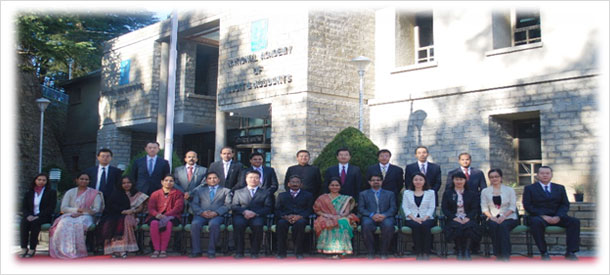
Life in the Academy
Successive generations of IA&AS Officer Trainees have stayed in 'Yarrows' – a very picturesque, stately and regal structure built on one of the spurs running from pleasant Hill. 'Yarrows' is built in the Swiss Chalet style. On either side are the beautiful 'Annandale' and 'Glen' Valleys. For those who have passed out of the Academy, 'Yarrows' has been a home away from home. Each and every IA&AS Officer has fond and nostalgic memories of 'Yarrows'- its ambience, warmth and comfort. In fact, 'Yarrows' is an integral part of the training Academy and one cannot imagine training in Shimla without 'Yarrows'.
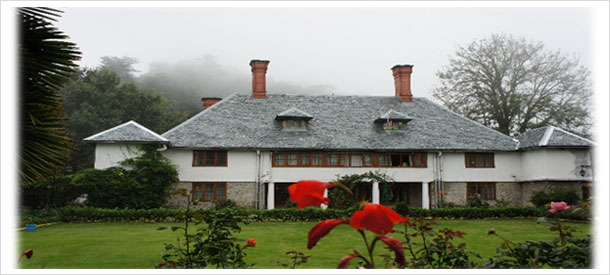
A variety of outdoor and indoor activities are available to the Officer Trainees. These include Lawn Tennis, Squash, Billiards, Carom, Chess, and Table Tennis. The sports complex has a state-of-the-art Gymnasium, as well. The facilities cater to a broad range of interests. Participation in extra-curricular activities is designed to develop espirit de corps as well as individual personalities. All Office Trainees are expected to participate in the corporate life of the Academy making full use of the facilities according to their tastes and disposition. The Academy places great emphasis on these activities and an appraisal of the participation in sports and other extra-curricular activities is taken into account in the overall assessment of an Officer Trainee.
Documentary : To sensitize the Officer Trainees with socially sensitive issues, the Officer Trainees are encouraged to prepare short films on socially relevant and sensitive issues in Shimla and surrounding areas. The last few batches made movies on 'Problems of Migrant Labourers in Shimla', and 'Urban Local Governance in Shimla' among others.
Crèche for Children of migrant labourers : An initiative by IA&AS Officer Trainees
Desire to help is inherent in all human beings and all want to make a positive contribution to society. Officer Trainees at the NAAA, Shimla have also made a humble effort to contribute to society by way of operating a Child Care Centre for children of migrant labourers.
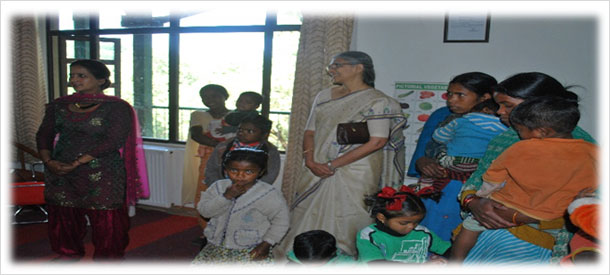
At the Child Care Centre, an attempt has been made to create a safe and conducive environment for their healthy development. The children are provided with pre-school education, healthy and nutritious food and regular health check-ups. Two full-time caretakers ensure that the crèche functions efficiently and regularly. The Directors and Officer Trainees also monitor the Centre daily. The Centre is run primarily on contributions by the faculty and trainees at the Academy.
Conclusion:
The Academy, thus, gives the Officer Trainees training for both their careers as well as provides the inputs for overall development of personality and character. The bond created therefore does not diminish with time but grows deeper with every passing year. The Academy and 'Yarrows' have grown to be the alma mater of the IA&AS Officers over generations and will continue to be so for many more years to come. |


